From the Andes to the Sea - a trek through the Esperanza Valley

Caramor - sailing around the world
Franco Ferrero / Kath Mcnulty
Thu 9 Mar 2017 19:06
41:07.37S 71:21.42W The coach pulled up outside the Bariloche bus station, Angie and I had arrived in Argentina for our multi-day trek across the Andes. We'd left Franco behind in Valdivia, busy working on the second edition of Gary Latter's Scottish Rock Volume 1. The man in the seat behind me barged forward, eager to get out first. I'd worked out that he was Argentinian because he had laughed (rather than fly to my rescue as any Chilean man would have done) when I was about to be run over by a bus at the border checkpoint. It was 3pm, we had no Argentinian money, nowhere to stay and only a vague idea of how to get to Pampa Linda, the start of our chosen route. We tramped into town past chocolate shops, ice-cream parlours and luxury gaucho emporia. A gang of workmen were laying stone sets in the pedestrionised main street and it reminded me of downtown Geneva, the street where the no.12 tram used to pass. 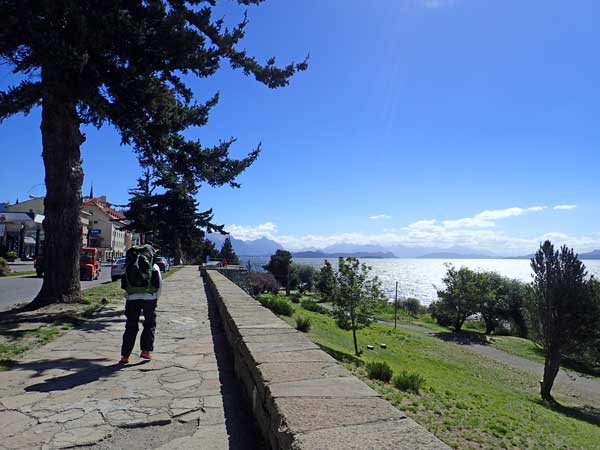 Tramping into Bariloche We passed under some arches and emerged into the main square. The ground was covered in white paintings, all of the same motif with writing next to them; the names of the people who were murdered during the military dictatorship 1976-1983. The government ‘disappeared’ around 30,000 people, opponents and innocent people. They were taken to secret government detention centres where they were tortured and eventually killed. These people are known as "los desaparecidos". In the middle was a statue of a tired looking horse with a man on its back. The rider was General Roca, infamous for his Conquest of the Desert (Patagonia) that would "extinguish, subdue or expel" the indigenous people who lived there. Nearby a St. Bernard sat on a bench looking bored, his owner earns a living charging tourists to have their photo taken with the mutt. 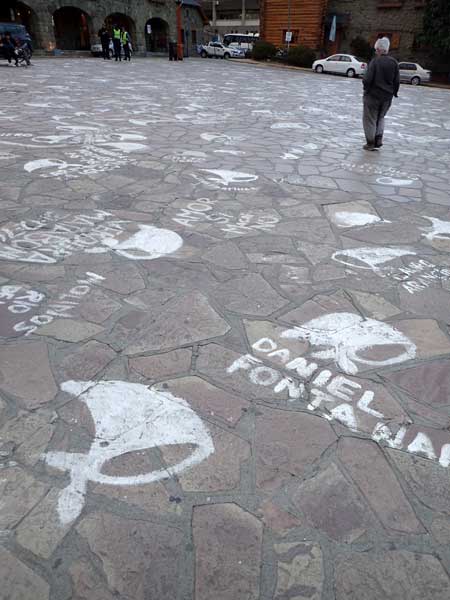 Remembering the people killed by the Argentinian dictators 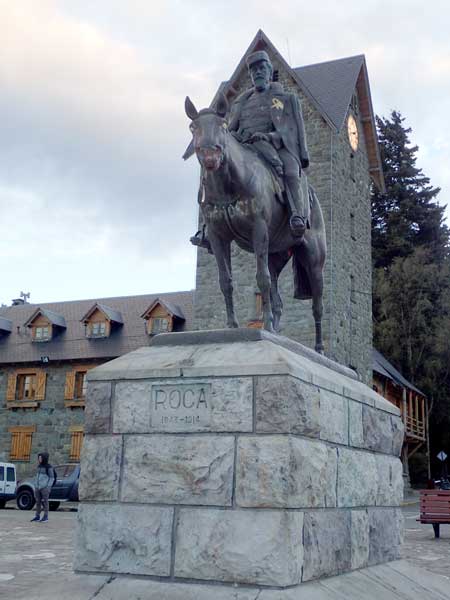 Roca - another mass murderer At the tourist office, we were given a list of 110 travel agencies and told that a few of them provide transport to Pampa Linda, but the woman didn't know which. We tried six or seven without luck before finding someone who could tell us where to go. The shop was supposed to re-open at 6pm so we waited. Potential customers came and went disappointed, Angie was becoming increasingly bored and still we remained. Finally, at 7:20 the lady arrived. Her excuse was that she'd been held up in traffic and she was sticking to it. We found a "cheap" hostel. The price at the door was considerably more than on the internet so the manager kindly lent us his computer so we could book online. Still, £16 for a bunk bed in a six-person dorm seemed a lot of money. The minibus drive to Pampa Linda through stunning countryside took two and a half hours, we then had a few formalities to complete before we could set off. At the Argentinian border police station, our passports were stamped. "You have a guide?" the two friendly officers asked. "Yes, of course, we have a guide(book)" I replied reassuringly. "You'll be passing the Chilean carabinero post, could you take something for them?” 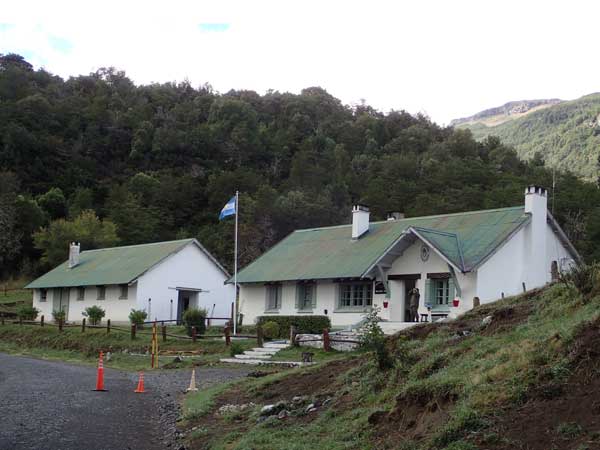 Argentinian border police station at Pampa Linda "Not a problem." I was the peace maker, my name would be written into history books as the broker of a new era of entente between Argentina and Chile. My chest swelled with pride. The sergeant produced a bag containing four rolls of toilet paper and a tin of shoe polish. 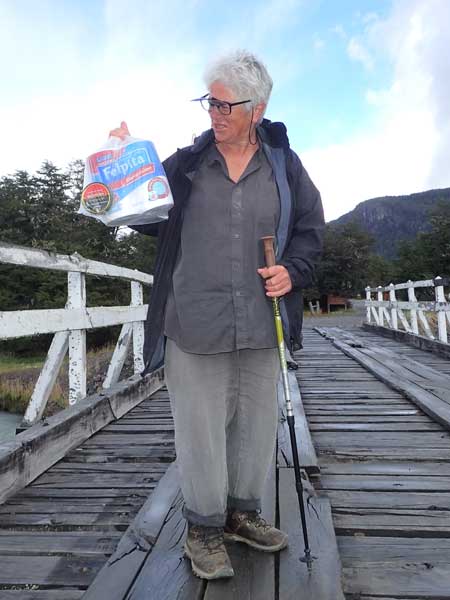 Angie with the 'bog roll of peace' "So where are we dropping that?" Angie asked as we wandered back over the bridge. “At the border post at the top of the pass". She found it hard to believe that I had been stupid enough to take on more load, as if our bags weren't heavy enough already. Next stop the National Park office where we completed a form about our gear and insurance policy. A quick update on the weather forecast and we were free to set off. The first section took a different route to the one we had followed on the horses so I concentrated on the course. We weaved our way up the valley through a narrow bamboo corridor. Once back on the horse path, my mind started to wander. "Toilet paper and shoeshine. Was this a gift of friendship? It seemed a little strange. Could it be some horrific practical joke hurled by the Argentinians at their long term enemies? "Wipe your arse and clean your boots!" And how better to play it than to get 'the Brits' to deliver it! Two birds with one stone. Oh dear, I was getting worried now. Maybe I should just pretend it never happened (but then I would have to cart the stuff all the way over the mountains). The officers had seemed so nice, could they really be that devious? Of course not, and they had kept a straight face. Maybe they were just good actors. Oh dear.”  Angie in the bamboo corridor 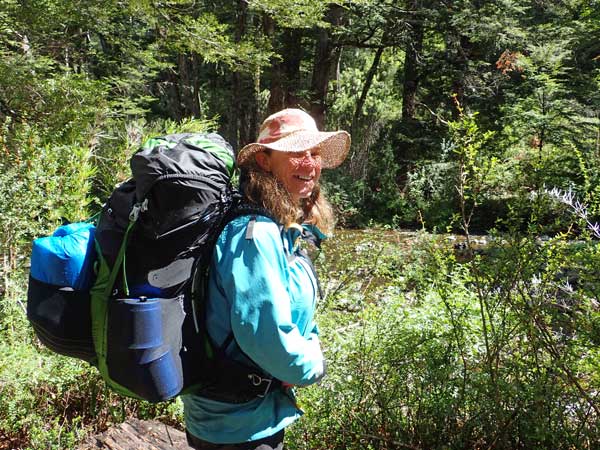 Kath with loaded rucksack It was steady uphill all the way and we made good time to the top of the pass. The fog was coming in and it started to drizzle. I was hopeful I would find the path, thus avoiding a slog through the marsh where we would sink down to our thighs. The path followed the edge of the marsh on slightly higher land in the woods. On the opposite side of the bog we could see the police horses grazing. It was raining heavily now and I changed into my sandals (Angie was already wearing hers) for the last few hundred metres across the top end of the wetland to the carabinero (Chilean border police) enclosure. As we removed our rucksacks I suddenly became aware of how wet we were.  The marsh through the trees and drizzle The door opened and a friendly face appeared "It's a wet day to be journeying, please come in." Within seconds we were sat in front of steaming mugs of coffee, fresh buns and manjar (very sweet spread made from milk), our wet clothes and shoes were hanging above the log stove, drying. 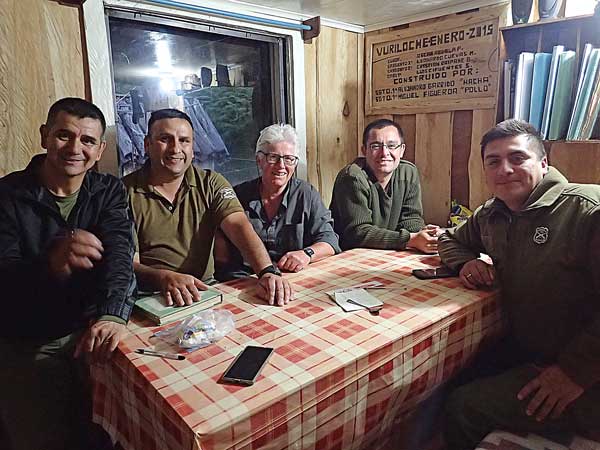 From left to right: the boss, Eduardo, Angie and the two younger officers whose names we never found out "I have something for you but I'm not sure it isn't a bad joke" I explained. "Bad joke?" the four Chilean policemen looked worried. As I handed over the parcel, three of them grinned and the fourth looked very happy indeed. The supply helicopter hadn't been able to land and they had run out of toilet paper. Argentinian shoe polish is apparently better quality than Chilean. They stamped us into Chile and asked if we had seen any horses. Our answer didn't surprise them and they looked glum. Eduardo explained that the two steeds had escaped that morning but that they absolutely had to get them in before night because of the puma. Although none of them had seen it, they often came across faeces and the smell terrified the horses. Three of the four officers disappeared into the bog and a little later the horses came galloping up. Muscles rippling, coat shining, mane swishing, these two looked like a bundle of trouble. The policemen returned soaking wet and still the horses played, it was another half hour before they allowed themselves to be captured and penned for the night. 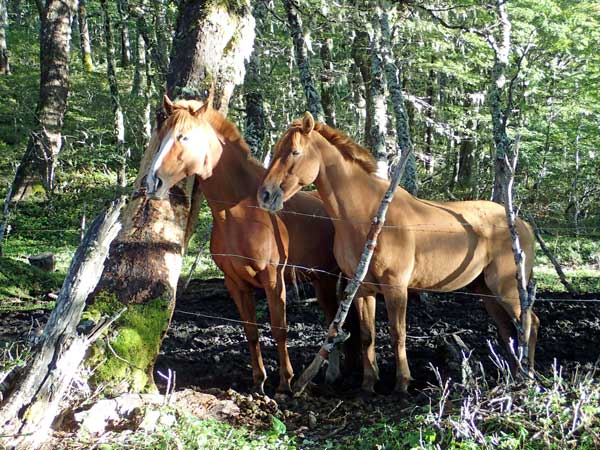 Two bad lads We cooked our noodles on their stove, shared their mate (stimulating herbal tea drunk through a metal straw) and enjoyed a sociable evening. The younger officers really missed their children and Eduardo showed us photos of his family. We discussed the route Angie and I would take and they mentioned someone called 'Juvenal' a few times. "Who is Juvenal?" I asked. We worked out that he was the old man with high blood pressure that Ciro had told us was called 'Carmelo'. I was glad we had cleared that one up and have a few words to say to Ciro next time we meet! Later the two younger officers cleared a space for us in the bothy/generator hut to sleep. It was a very cold night. 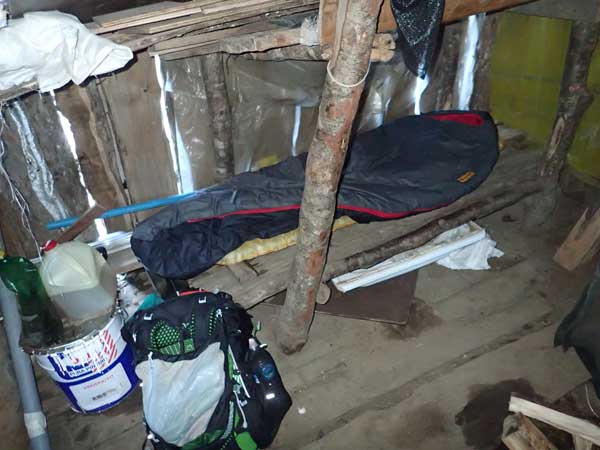 Bivvying in the bothy/generator shed |